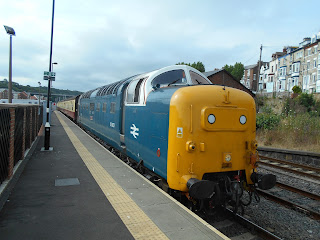The North York Moors Railway is a “heritage” railway,
meaning that it transports contemporary passengers on outdated trains to
outdated stations for exorbitant fares. Although trains and stations have been
refurbished, they typically don’t meet current standards for disabilities or
comfort. Most of the “employees” are volunteers – many probably doing the same
jobs they did while employed. The heritage railways are for fanatics, which may
include me because I enjoy riding on them.
The ride from Whitby to Pickering is only 18 miles, but
takes about 1½ hours. The tracks generally follow the Esk River valley, providing
the same scenery you would enjoy if you walked it. Many people hop on and off
the train and walk parts of it. I didn’t hop off, but I did nod off from time
to time, if that counts.
I timed my trips to take an historic diesel engine to
Pickering, and return to Whitby on an historic steam engine. Once aboard,
you don’t really see the engine except on tight curves, and then only if you
are in the last carriage, too far to get a picture. You could hear the
difference, though; at each stop the roar of the diesel engine grew louder when
accelerating, while the tempo of the steam engine’s chugging increased, but not
its decibels.
Due to my schedule, I had less than an hour in Pickering,
which was more than enough. I’m still not mentioning the U.S. election
campaign, but I thought it interesting that these two establishments were right down the street from each other. Maybe our cultures are closer than
I thought.
To round out my tourist day, I took a hop-on, hop-off
bus tour of Whitby. I did the entire tour without hopping off, because I knew I
wouldn’t hop back on once I got off. The good thing about the tour is that it was
on a modern bus, so the fare was low. It was worth every tuppence I paid.






